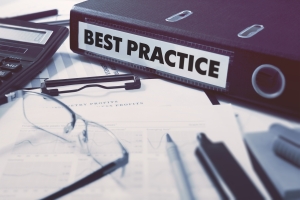When you look at people who are financially fit, they all have several things in common. They know the value of money and have developed plans and habits that keep them in shape — financially speaking, of course. They are never late with their bills. They know the value of money. They have little to no debt at all.
These are their habits. They all have this common thread, which binds them together. They know what to do when it comes to money — and what not to do. They may not have thousands of dollars in the bank, but they are still financially fit. They just handle money in a way that seems magical to many of us.
The truth is that it is not magic. There is no secret formula that they follow. They have one thing in common: Good financial habits.
Anyone can do this. You just need to know where to start. Below, you will find 10 habits that these people all have in common. Best of all, they are things you can start doing today.
1. Have a Written Budget
This is the key to any financial plan. Many people – sort of, have a budget. They know who they have to pay each month, but maybe it’s not in writing. When you have a written budget, you see exactly where your money goes. Best of all, you can direct your money where you want it to go. You can decide what you want to save and how much you want to spend on groceries. When writing out your budget, be sure to include every single expense (don’t forget about the coffee you stop for every morning or if you pay for parking each day). Your budget is your roadmap to financial success.
2. Pay Your Bills On Time
Never be late with your bills. There are so many ways to ensure they get paid on time, including easily setting up automatic payments or setting reminders on your phone. You can even use a calendar and write in due dates. When you pay your bills on time you show you are responsible. Not only that, but you won’t have to worry about late fees either.
3. No Need for Immediate Satisfaction
It can be tempting when you are shopping to pick up that new bag or pair of shoes. However, do you really need them? Will buying them truly make you happy? Why do you want to buy them? Asking yourself these questions can help you avoid emotional purchases, which typically only lead to buyer’s guilt later on. If you do want to buy something, use the 24 hour rule: Go home and think about it. Check your budget, and if 24 hours later you still really want and can afford the item – go ahead and purchase it.
4. Try Not to Use Credit or Debit Cards
Cash is one of the best ways to ensure you are financially fit. Even if you think you use credit cards the right way and pay them off each month, you could still be overspending. For example, if you only have $100 to spend on groceries, you can’t spend even $101 if you only have cash. If you are using plastic, it’s often too easy to spend more than you anticipate.
5. Keep the Lines of Communication Open
Have regular budget updates with your other half – look over your finances and check your spending. Don’t hide money or spending – just be honest. Try to make time for a monthly meeting, and add it to both of your calendars so you can go over your budget together.
6. Pay Down Debt
Take steps to pay off any debt you have. If there’s a lot of it, you will probably need to create a debt pay off plan. It may take some time, but you can do it!
7. Save Money Every Month
Your budget should include a line item for every penny you earn, including savings. Saving could be needed for retirement, holidays, emergencies, and so on. There is never a right or wrong thing to save for. The best trick here is to automate your savings. When it’s automatic, you can never make excuses for yourself that you can’t save. Instead, it’s money not available for you to spend – and this is never a bad thing!
8. Live Within Your Means
Who wouldn’t love a huge house or fancy car? We all would – but can you actually afford it? Everyone has a different income, therefore the way we live will be different based upon that income. The real difference is not in how much you make, but in what you spend. If you can’t afford that huge house right now, you shouldn’t buy it.
9. Use Credit Wisely
Credit cards can be a great way to not only build your credit, but also to gain rewards and perks. But, you need to use credit cards the right way. Never charge more than what you have in the bank – if you only have $500 in your account, do not charge more. The reason being, a payday is never a guarantee. You should generally be able to pay your balance in full each month, and on time.
10. Balance Your Accounts Regularly
While you can use online banking 24/7 to check your account balances, there may still be transactions that haven’t posted yet, checks that haven’t cleared, and online bills that haven’t been reflected yet either. If you balance your account regularly, you know exactly what you have to spend.
These 10 habits will easily get you to be financially fit. You don’t have to start with all ten at once – even if you master a few now and slowly add in the others, you’ll be financially fit in no time!
Article Source: Tracie Fobes for Gobankingrates.com, https://www.gobankingrates.com/personal-finance/financial-habits-need-start-today/

